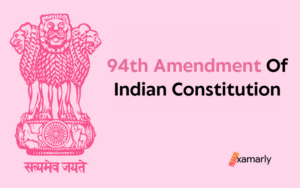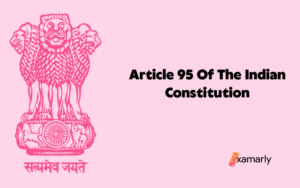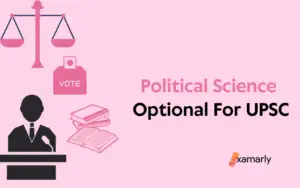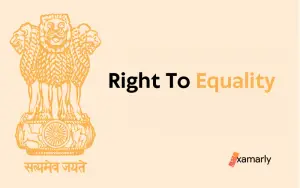What does the Indian Constitution indicate by the Anti Defection Law? Who does it primarily cater to? What are its regulations and deviations? Which amendment played a crucial role in the betterment of this law’s effectiveness? Let us unravel one question at a time.
First, we will look into what the Anti-Defection Act mentioned in the Constitution is and how it applies to different aspects of public life. Then, we’ll move on to examine what amendments have been made to this important piece of the Indian Constitution. The Anti-Defection Law has great importance in the UPSC Syllabus of Indian Polity of General Studies Paper. Let us understand it in detail.
- What Is Anti Defection Law?
- Amendment That Made Anti Defection Law
- Why Was Anti Defection Law Enacted?
- What Are The Grounds For Disqualification Of Defectors?
- Exceptions Under Anti Defection Law In India
- What Is Not Considered Defection According To The 10th Schedule?
- Role Of The Presiding Officer
- Recommendations On Anti Defection
- Conclusion
What Is Anti Defection Law?
Before looking at anti-defection law, we need to know what defection means. In very simple terms, defection means the abandonment or desertion of one’s duties and allegiances. Contextually, defection refers to the act of abandoning a political party and changing affiliation after being elected to an electoral seat.
Why is this wrong? There are two factors to consider here – motive and ideology. Quite often the motive behind such a decision is the monetary benefits that the new group provides to the candidate. Now, this begs the larger question of what a person stands for. Because many voters would have voted for the candidate by believing not just the candidate’s ideology but the party’s ideology as well. Thus, the voter feels deceived.
The anti-defection provision came into force through the Constitution’s 10th schedule. The law provides the footing for disqualification of a legislator from either the Legislative Assembly or the Parliament. The law was prompted by a controversial case in which a congress leader, Gaya Lal, changed parties three times in a fortnight. This case led to the enactment of the Anti-Defection Law. It was put into effect on 1st March 1985. Thus, individual MPs/MLAs who shift alliances are subject to the anti-defection law. Its goal was to keep governments stable by deterring MPs from switching or party-hopping.
Amendment That Made Anti Defection Law
This law was incorporated into the Indian Constitution through the fifty-second Amendment. It included clauses for dismissing and barring such defectors from becoming ministers for a speculated period of time.
It all began with “Aya Ram Gaya Ram”, a phrase that become popular in Indian politics after Gaya Lal (MLA from Haryana) switched allegiances three times in one day. Following its approval in the Lok Sabha in the presence of previous PM Rajiv Gandhi, this law entered into force in March 1985.
Why Was Anti Defection Law Enacted?
The concept of defection may be misunderstood. Defection refers to a loss of allegiance to one party in exchange for another. That’s why the Indian Constitution prohibits defections. A significant goal of the Anti-Defection Law is to sustain political stability and strengthen democracy. It also serves the additional purpose of reducing political corruption and thus making the Members of the Parliament much more responsible.
The Tenth Schedule of the Indian Constitution prohibits political defections to a larger extent. The grounds of disqualification is to prevent members of one political group from defecting to another. It also disqualifies them from holding remunerative political posts. The Constitution also requires that a defector’s vote to overthrow a government must be null and void. Nonetheless, the Tenth Schedule has done a good job of curbing grounds of defection to a considerable extent.
Advantages Of 10th Schedule Of Indian Constitution
- Maintains government stability by preventing shifts in party allegiance.
- Means of guaranteeing that candidates, as well as the citizens, bestow loyalty to the party.
- Allows political parties to unite without being subject to anti-defection laws.
- Punitive measures can be taken against a member who switches parties.
- Promotes party discipline.
- At the political level, it is expected to curb corruption.
What Are The Grounds For Disqualification Of Defectors?
- If an elected official leaves a political party voluntarily
- If a situation arises where member votes or refrains from any important votes as opposed to the directive circulated by the respective political party
- If a member of a political party who has been elected as a representative joins another political party.
- If a nominated person switches to a different political party after six months of taking office
Exceptions Under Anti Defection Law In India
According to this law, a legislator may not defy the party whip or change their party membership without the approval of the Presiding Officer of that legislature.
This provision does not apply to mergers of two or more political parties. Mergers and splits of more than 33% of the party’s membership are not subject to this Law. Instead, mergers and splits of more than 40 members of the party do not violate the Anti Defection Law. In practice, these exceptions are almost never used. Thus, the Constitutional Amendment has a broad scope and is well suited for smaller parties.
What Is Not Considered Defection According To The 10th Schedule?
- If a whole political party merges with another political party, a split in that party will not be deemed a defection.
- If elected members of one political party form a new political party.
- If he or other members of the party have refused to accept the merger of the two original party and have instead chosen to perform as a separate organization or independent candidate from the moment of the merger.
Role Of The Presiding Officer
Initially, the law stated that the Presiding Officer’s decision is not judicially reviewable. Later this issue was addressed in 1992 by the five-judge constitution bench of the Supreme Court who overturned this condition, permitting appeals to the High Court and Supreme Court against the Presiding Officers. It did, however, rule that no court involvement is permitted till the Presiding Officer issues his order.
Is the decision of the Presiding Officer subject to judicial review?
- Initially, the Act stated that the presiding officer’s decision was absolute and non-challengeable in a court of law. However, in the Kihoto Hollohan V Zachillhu case (1992), the Supreme Court of India deemed this provision invalid on the grounds that it aims to limit the SC’s and high courts’ authority.
- The court ruled that when dealing with cases involving the 10th Schedule of the Indian Constitution, the presiding officer must serve as a tribunal. As a result, his or her decision was susceptible to court review for factors like malafides, perversity, and so forth, just like the decision of any other tribunal. The court, however, rejected the claim that the presiding officer’s adjudicatory powers are unlawful in and of themselves due to political bias.
- However, it was decided that no judicial involvement would be possible until the Presiding Officer issued his order. In 2015, after hearing a plea stating that the Telangana Assembly Speaker had postponed taking some action against a member in accordance with the anti-defection law, the Hyderabad High Court refused to interfere.
Is there a deadline by which the Presiding Officer must make a decision?
- According to the law of Indian politics, the Presiding Officers have no time limit in which to deliberate on a petition for disqualification. The courts can also only intervene after the officer has finalized their decision. Therefore the petitioner’s only choice is to stay patient till the officer has reached a decision.
- In a number of cases, the courts have voiced concern about the unnecessarily long time it takes to decide such petitions.
- There have been a few instances where lawmakers who had left their political parties continued to serve in the House as members of the Legislative Party because the Speaker or Chairman delayed making judgments.
- There have also been instances where members of the opposition have been appointed as ministers in the administration while remaining constituents of their earliest political and legislature party.
How did the courts interpret the law while making decisions regarding relevant issues?
- Various provisions of the statute have been interpreted by the Supreme Court.
- ‘Voluntarily gives up his membership’ has a broader meaning than resignation. A member can become out of the running if he ‘voluntarily gives up his membership,’ according to the statute. Nevertheless, the SC has ruled that resigning from a membership might be inferred from his behavior even if he does not formally resign.
- In other circumstances, members were regarded as having resigned if they publicly expressed support for another party or were opposed to their own. The Chairman of the Upper Chamber of Parliament recently banned two leaders of Janata Dal from the house on the grounds that they were engaging in anti-party politics and had “voluntarily” given up their party membership (which is not true to resignation as per Supreme Court orders).
Does this law impact the ability of lawmakers to make decisions?
- This bill tries to keep the government stable by preventing Representatives from switching sides. A legislator is not permitted under this state law to vote in accordance with his or her conscience, judgment, or the interests of the electorate.
- By guaranteeing that members vote in accordance with the party leadership’s decisions rather than what their constituents want them to vote for, this type of situation hinders the legislature’s ability to oversee the government.
- The legislation serves as the link between both the elected legislator and constituents.
Recommendations On Anti Defection
Dinesh Goswami Committee
The Dinesh Goswami Committee’s recommendations include limiting disqualification petitions to circumstances when a member has willingly resigned from his political party or when members vote against party directives or refrain from voting.
Law Commission 170th Report
The pre-poll electoral fronts should be treated as a single party under the 10th Schedule. The exemption for mergers and splits should be removed. Further, whips should only be used in crucial situations or votes.
Election Commission
President or Governor be made the final arbiter of disqualifications, with the Election Commission providing binding advice on disqualifications in accordance with the provisions of the Representation of Peoples Act on the Office of Profit.
Conclusion
Anti defection bill was introduced under the 10th schedule of the 52nd Amendment of the Indian constitution to protect the country and it successfully did it from various political corruption and preserve the democratic rights of the citizen by Indian Courts. Although there have been several positive developments owing to the Anti-defection law, it has had its own share of shortcomings. Thus, suggestions and recommendations given are to be taken into consideration for the betterment of the Indian democracy.






